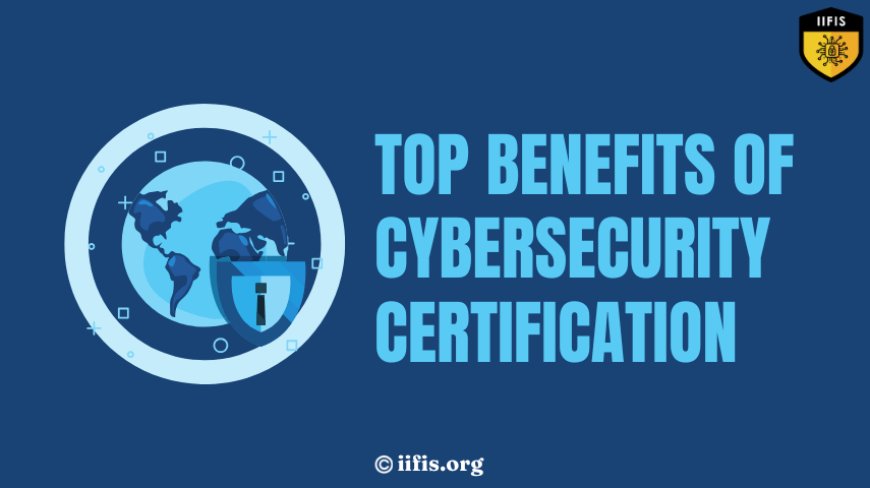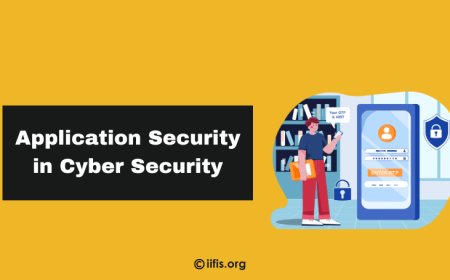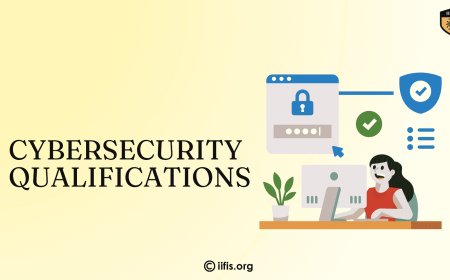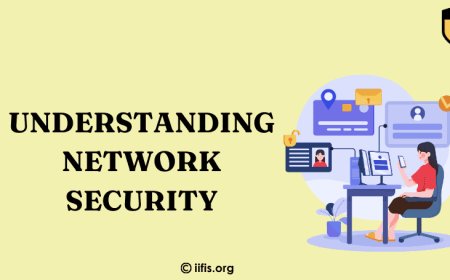Top Benefits of Cybersecurity Certification
Unlock career growth and enhance your skills with cybersecurity certification. Discover the top benefits, from higher job prospects and earning potential to advanced knowledge and industry credibility.

In an age where digital threats are constantly evolving, having a strong foundation in cybersecurity is essential not only for protecting personal and organizational data but also for building a rewarding career in a high-demand field. A cybersecurity certification can open doors to new job opportunities, provide specialized knowledge, and build confidence in tackling real-world security challenges. From gaining hands-on skills to boosting career prospects and staying current with industry standards, there are many advantages to earning a cybersecurity certification. In this blog, we’ll explore the top benefits of pursuing cybersecurity certification and how it can set you on a path to success in the tech world.
Enhanced Knowledge and Skills Through Cybersecurity Certifications
-
Core Skills Covered: Cybersecurity certifications teach essential skills like threat detection, vulnerability assessment, and response planning, enabling professionals to effectively manage and mitigate security risks.
-
Staying Current: Certifications help professionals keep up-to-date with the latest security protocols and technologies, allowing them to address new threats and challenges.
-
Popular Certifications:
-
CompTIA Security+: Focuses on foundational security concepts, including network security and basic threat management.
-
CISSP (Certified Information Systems Security Professional): Covers advanced areas like risk management, network security, and security architecture.
-
CEH (Certified Ethical Hacker): Teaches penetration testing and vulnerability assessment, focusing on identifying and defending against system weaknesses.
-
Hands-On Learning: Many certifications emphasize practical skills through labs and simulations, preparing professionals for real-world cybersecurity scenarios.
-
Career Growth: Gaining these certifications builds a strong foundation for career advancement, offering specialized knowledge valued by employers.
Increased Career Opportunities with Cybersecurity Certifications
-
Rising Demand Across Industries: With more businesses relying on digital systems, the need for cybersecurity professionals is growing in sectors like finance, healthcare, and government.
-
Diverse Roles: Certifications can qualify candidates for a variety of positions, including:
-
Cybersecurity Analyst: Focuses on monitoring and protecting systems.
-
Penetration Tester: Conducts authorized attacks to identify system vulnerabilities.
-
Security Consultant: Advises organizations on security strategies and solutions.
-
Certifications and Career Paths:
-
CompTIA Security+ aligns well with entry-level roles like cybersecurity analyst.
-
CISSP is often required for senior positions in security management and consulting.
-
CEH (Certified Ethical Hacker) is ideal for roles in ethical hacking and penetration testing.
-
Broader Job Market Access: Certifications make candidates more competitive, providing qualifications that are recognized and valued across various industries.
Higher Salary Potential with Cybersecurity Certifications
-
Increased Earnings: Certified cybersecurity professionals often earn higher salaries than their non-certified peers. For instance, individuals holding the Certified Information Security Manager (CISM) certification in India can expect an average salary of ₹26.2 lakh per annum, with potential earnings ranging from ₹23 lakh to ₹50 lakh annually.
-
Certification-Specific Salaries:
-
CISSP (Certified Information Systems Security Professional): Professionals with this certification in India can earn between ₹20 lakh to ₹30 lakh per annum, depending on experience and role.
-
CISM (Certified Information Security Manager): As mentioned, average salaries are around ₹26.2 lakh per annum, with potential to reach up to ₹50 lakh.
-
Demonstrated Expertise: Certifications validate a professional's knowledge and skills, making them more competitive during salary negotiations. Employers recognize the value of certified individuals, often offering higher compensation to attract and retain such talent.
By obtaining recognized certifications, cybersecurity professionals can significantly enhance their earning potential and stand out in the job market.
Industry Recognition and Credibility
-
Professional Credibility: Holding a recognized cybersecurity certification, like CISSP (Certified Information Systems Security Professional) or CISM (Certified Information Security Manager), enhances credibility. These certifications signal to employers that the professional has proven skills and knowledge, which builds trust in their abilities.
-
Validation of Skills: Certifications validate both knowledge and experience in cybersecurity, showing employers that certified professionals are well-equipped to handle security challenges.
-
Industry Respect: Certifications like CISSP and CISM are highly regarded across industries, making certified individuals stand out in a competitive job market. Employers value these credentials because they reflect a commitment to high standards in security practices.
Pathway to Career Advancement
-
Career Growth: Certifications provide a clear pathway to more senior roles in cybersecurity. For example, a professional might start as a junior analyst and, with certifications, progress to positions such as Cybersecurity Manager or Security Consultant.
-
Specialized and Leadership Roles: Certifications set professionals apart for roles that require advanced expertise or leadership, such as Security Architect or Chief Information Security Officer (CISO). Many companies consider certifications essential for these roles due to the high level of responsibility involved.
-
Real-World Examples: Many cybersecurity professionals leverage certifications to move from entry-level roles to management or consulting positions, demonstrating that certifications can play a key role in career advancement and access to specialized fields within cybersecurity.
Improved Job Security
-
High Demand, Low Unemployment: Cybersecurity is a field with consistently high demand and very low unemployment rates. With cyber threats increasing, industries like healthcare and finance are in constant need of skilled professionals to protect sensitive information.
-
Job Security through Certification: Earning a certification adds an extra layer of job security by validating expertise in a competitive market. Certified professionals often stand out to employers as reliable assets for safeguarding organizational data and systems, which makes them more indispensable to their teams.
Networking Opportunities and Access to Resources
-
Building Connections: Certifications often connect professionals to exclusive communities, networking events, and industry conferences, providing opportunities to build relationships with other experts in the field.
-
Access to Exclusive Resources: Certification bodies often offer resources like job boards, online learning materials, and continuing education courses, giving professionals tools to stay updated on industry trends and practices.
-
Staying Current in a Dynamic Industry: In an ever-changing industry like cybersecurity, staying connected with other professionals and learning about the latest tools and threats is essential. Networking and access to specialized resources help certified professionals remain adaptable and prepared for new challenges.
Earning a cybersecurity certification offers numerous benefits, from gaining specialized knowledge and skills to enhancing job security, increasing earning potential, and opening doors to career advancement. Certifications also provide industry recognition, build professional credibility, and connect professionals to valuable networks and resources, all of which are crucial in the fast-evolving field of cybersecurity.
For those considering a career in cybersecurity or looking to grow within the field, pursuing certification is a smart step that can unlock exciting opportunities and set the foundation for long-term success. Organizations like the International Institute of Financial & Insurance Studies (IIFIS) offer programs to help you achieve these credentials and build a solid career path.























